News
New SC judges stress the need for people-friendly laws, quality judgments and adherence to noble principles

Justice A.H.M.D Nawaz
The ceremonial sittings for six newly-appointed Supreme Court Justices were held at the Supreme Court on Wednesday and Thursday under COVID-19 compliant guidelines.
Justices A.H.M.D. Nawaz, Kumuduni Wickremasinghe, Shiran Gooneratne, Mahinda Samayawardhena, Achala Wengappuli and Janak De Silva were ceremonially welcomed at the Supreme Court complex.
Chief Justice Jayantha Jayasuriya, other Justices of the Supreme Court, Judges of the Court of Appeal, High Court and District Magistrates were present.
Justice A.H.M.D Nawaz told the gathering that the judiciary’s biggest challenge today was to make the law socially relevant and a friend, rather than an enemy, of the people. He was elevated to the Supreme Court after serving as President of the Court of Appeal. The law, he stressed “cannot be alienating, arbitrary and exclusionary.” He said he was grateful for the opportunity to make the law more accessible to ordinary citizens.
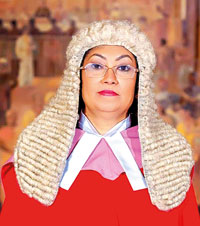
Justice Kumuduni Wickremasinghe
“I entertain the sanguine hope that we will be able to contribute to the urgent need to salvage the image of the law so that it, in fact, is, and is properly perceived to be, a friend and protector of the people instead of being viewed as an instrument of oppression or discrimination,” Justice Nawaz elaborated. “It is only through the restoration of the legitimacy of the law that law can play its most important role in bringing justice to the people and restoring the moral fabric of our society so tragically undermined by various instances in the past.”
While the responsibility to develop the law may devolve, ultimately, upon the 17 justices of the Supreme Court, this process is a matter for collaboration between bar and bench, Justice Nawaz pointed out. “They are institutions with close historical and personal associations,” he said. “The bar loses its raison d’etre if the Court has to decide a matter unaided. I scarce think it is harder to resolve very difficult cases in law, than it is to direct the bar what course it should take to enable itself to do so. There is thus a joint journey which must be undertaken with a faith which is optimistic and a temper which is positive.”
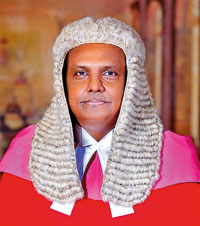
Justice Shiran Gooneratne
Justice Kumuduni Wickremasinghe in her speech said the country’s judiciary enjoys high prestige and is the pride of every citizen. “The responsibility of a Judge is to safeguard this and dispense justice to society while protecting and preserving these values.”
The numbers of Apex Court judges had not been increased since 1978, but now a giant step has been taken to accommodate more appeals and revision applications from the original Courts. There had been a bottleneck for so many decades, she observed: “Therefore, we have to work together to dispense justice to society and clear the back log. The staff also should be trained accordingly and provided with sufficient facilities.”
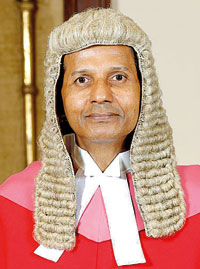
Justice Mahinda Samayawardhena
She also spoke of the challenges posed by the prevailing situation due to COVID-19, which “has given us the warning that it is high time that we moved with technological development and familiarised ourselves with electronic systems and commenced hearing cases via online platforms.”
This warrants the utilisation of online platforms to hear cases since it is not healthy for a country to halt its judicial functions even in a time of a pandemic. “It has to be noted that initiatives have been taken to hear cases via online platforms,” she said. “It is suggested that we take note of the urgency to educate the judiciary to conduct cases online, to avert the delay in the disposal of cases.”
Justice Wickremasinghe added that she feels she is duty bound to look into the interests of women and children as the gender representative of the Indian Ocean countries appointed by the Commonwealth Magistrates and Judges Association.
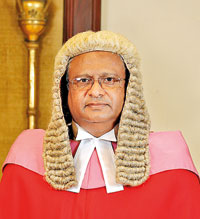
Justice Achala Wengappuli
Addressing the ceremony, Justice Shiran Gooneratne said: “All persons before our courts, immaterial of being rich or poor, or their social standing, are equally entitled to the protection and the application of the law.”
Justice should be meted out equally and equal protection of the law should be safeguarded to all manner of people according to law, he asserted. “Like cases should be treated in a like manner. Everyone should be equally entitled to the protection of the law and no difference in capacity or desert is relevant.”
“Equal access and equal protection before the law should not only be ensured but also seen to be ensured, to all alike who come before the courts of law to redress their grievances,” he continued.
“The increasing complexity in modern society is inevitably reflected in the cases that come before the court and the judgments to be delivered, what might be called the daunting challenge before the judiciary to decide cases according to law and the mission to serve the cause of equitable justice.”
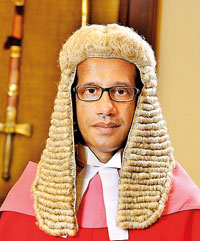
Justice Janak De Silva
The administration of justice is not only a sacred duty in the hands of the judiciary but a shared responsibility between the Bar and the Judiciary, Justice Gooneratne stressed. “The lawyers who appear before the court contribute in no less measure to the effective and efficient function of the administration of justice.”
Cases must be heard and decided without delay, noted Justice Mahinda Samayawardhena: “As the famous saying goes, justice delayed is justice denied. However, I am also conscious that justice hurried is justice buried and, therefore, tardy justice is still better than swift injustice. It is essential that justice shall be delivered expeditiously without compromising on quality. To strike a fine balance between quantity and quality is a challenging task.”
Judges must keep abreast of the developments in the law, he stated: “Courts exist to subserve the interests of the rule of law, to preserve law and order, and to protect the public. In my view, the disposal of cases on high-flown technical grounds alone, unless there are compelling reasons, will not augur well for the administration of justice in the eyes of the victim or the complainant. Judges shall develop the law in line with present needs. The quality of a judgment is largely dependent on the quality of submissions made by counsel, along with independent research done by the Judge. Therefore, lawyers are also directly responsible for the development of the law.”
Justice Samayawardhena said he was thankful to the Justice Minister for taking a series of steps to arrest laws delays. These initiatives include increasing the number of courts and Judges, improving infrastructure facilities, introducing law reforms, simplifying procedural laws, and introducing modern technology for the speedy disposal of cases. “These projects are still in embryo,” he observed. “But there is renewed hope that the future will be better insofar as laws delays are concerned.”
Justice Achala Wengappuli in his speech said: “The principles of integrity, commitment, courtesy, fairness and justice have guided me at all times in my professional and personal life and let me assure you that I shall enshrine these principles in the discharge of my duties as a judge of the Supreme Court.”
“It is my fervent belief that if every professional involved in the administration of justice were to hold steadfast to these principles we will be able to significantly uplift the standards of justice meted out,” he continued. “As variously reminded, judges are not academicians striving to expound the intricacies of the law, but administers of justice.”
Justice Wengappuli remarked that ideals of justice cannot be based on abstract conceptions but on the basis of the real and practical needs of the people. It is not a principle that can be applied top-down, but instead understood from the peculiar circumstances of each case.
“I must in fact say that what little success that I may have achieved in the discharge of my duties as a Judge, both in the High Court and in the Court of Appeal, have been largely due to the cooperation that I have always received from the members of the Bar, both Official and Unofficial,” Justice Wengappuli noted, adding that he looked forward to receiving the continued cooperation from the Bar.
A judge will have several cases to deal with and there may be a temptation to identify some as important and others as not important, said, Justice Janak De Silva.
“In fact, we do hear counsel sometimes making the application that his or her case is of great importance public or otherwise. That may well be the case. But for the litigant, his or her case is as important as any other case. As Edmund Burke once said, Courts are made for the suitors, and not the suitors for the court,” he said.
A judge must give the same conscientious attention to every matter before him, bearing in mind that the litigant is before court due to the confidence reposed in the judicial system, he noted, warning that an erosion of this will lead to the waning of the rule of law.
Some of the traditions of the Bar may have to be resuscitated, Justice De Silva commented. “The practice was for the junior to be called upon to argue the matter when the senior was held before another division,” he recalled. “There may be a greater need for this with the increase in the number of benches in the Superior Courts. It must be borne in mind that many a great counsel of the past first made an impression by arguing the case on behalf of his senior.”
The backlog of court cases is a perennial problem and has to be addressed urgently and quickly, methodically and efficiently in order to deliver speedy justice and prevent laws delays without compromising the quality of justice and thereby, winning the confidence of the people, said Attorney General Dappula De Livera, in his speech welcoming the judges.
The credibility of a judicial system in a country is dependent on the Judges who man it, he added. Judges must be persons of impeccable integrity and unimpeachable independence. A Judge must discharge his judicial functions with high integrity, impartially and intellectual honesty, he remarked.
Welcoming the justices on behalf of the Bar, Bar Association of Sri Lanka President (BASL) Kalinga Indatissa remarked that it is said that a good judge must necessarily possess the following aspects of proper judicial temperament. Patience, open mindedness, courtesy, tact, courage, punctuality, firmness, understanding, compassion, humility and common sense.
“Your Lordships’ and Your Ladyships’ appointment to this Honourable Court is a recognition of such qualities, apart from Your Lordships’ and Ladyships’ knowledge, experience and skill,” he stressed.
Ceremonial Sittings of SC Judges – Complete Speeches:
1. Justice A.H.M.D. Nawaz
2. Justice Kumuduni Wickremasinghe
3. Justice Shiran Gooneratne
4. Justice Mahinda Samayawardhena
5. Justice Achala Wenappuli
6. Justice Janak De Silva
7. Attorney General Dappula De Livera
8. BASL President Kalinga Indatissa


